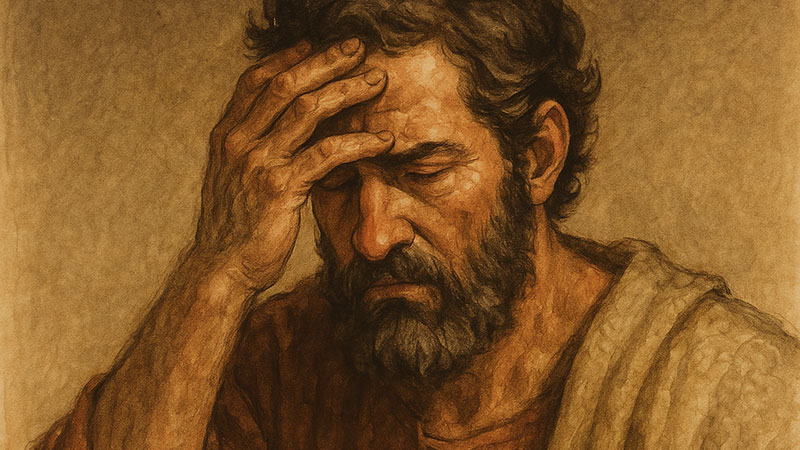In the Protestant Christian tradition, the story of Abram, later named Abraham, is one of great faith, promise, and human imperfection. The Bible holds him up as the “father of faith,” yet his journey with God was not without flaws.
While Abram is remembered for his deep belief in God’s promises, the Bible also records moments when fear, doubt, and impatience led him to make wrong choices. These actions, considered Abram’s sins, offer vital spiritual lessons that remain deeply relevant for believers today.
This article, written for the readers of the Peidayesh website, seeks to explore Abram’s sin as described in the Scriptures. Drawing from the Protestant perspective, we believe that the way, the truth, and the life are found only through faith in the living God, and ultimately through Jesus Christ.
Abram’s story is more than a history lesson; it is a mirror into our struggles with trust, fear, and obedience. By walking through the biblical account, we aim to understand what went wrong, how God responded, and what timeless wisdom we can carry into our own lives.
Similarly, examining other key biblical figures can deepen our understanding, for instance, exploring what-was-noahs-sin-biblical-answer offers insight into human weakness and God’s grace in another pivotal moment of scripture.
Abram’s Background: A Man of Faith
Before diving into Abram’s sin, it’s important to understand who he was. In Genesis 12, God called Abram to leave his homeland and go to a land that He would show him. Without knowing the final destination, Abram obeyed.
His faith was strong enough to leave comfort and step into the unknown. Hebrews 11:8 honors this faith: “By faith Abraham obeyed when he was called to go out to a place that he was to receive as an inheritance.”
However, as with many great men and women of the Bible, Abram’s faith journey had its ups and downs. He was not perfect. His story reveals a deep truth: God uses imperfect people to accomplish His perfect plans. This context helps us better understand the nature and consequences of Abram’s sin.

What Was Abram’s Sin?
There are two major events in Scripture that many scholars and theologians identify as key moments of Abram’s sin:
- Abram’s Deception in Egypt (Genesis 12:10-20)
- Abram’s Decision to Have a Child with Hagar (Genesis 16)
Let’s look at both in detail.
1. Abram’s Deception in Egypt
Soon after Abram entered Canaan, a famine struck the land, and he went down to Egypt to find food. This was not necessarily sinful—he was acting out of survival. However, what he did next reveals fear and a lack of trust in God.
Knowing that his wife Sarai was beautiful, Abram feared that the Egyptians might kill him to take her. So he asked Sarai to say she was his sister (Genesis 12:13). This was a half-truth, as Sarai was indeed his half-sister (Genesis 20:12), but the intent was deception.
Pharaoh took Sarai into his palace, and as a result, Abram was treated well. However, God intervened and afflicted Pharaoh and his household with plagues (Genesis 12:17). When Pharaoh realized the truth, he rebuked Abram and sent him away.
Key Lesson: Abram’s sin here was not trusting God’s protection. His fear led to deception. Yet, even in his failure, God remained faithful. This shows us that while human faith can falter, God’s promises do not.
2. Abram, Sarai, and Hagar: A Plan Outside of God’s Will
Years after God had promised Abram many descendants (Genesis 15:5), he and Sarai still had no children. Impatience began to grow. Instead of waiting on God, Sarai offered her servant, Hagar, to Abram so they could have a child through her. Abram agreed (Genesis 16:2-4).
Hagar conceived Ishmael, but this caused conflict and suffering. Sarai grew jealous and mistreated Hagar, who fled into the desert. Although God showed compassion to Hagar and Ishmael, this act of impatience had long-term consequences, both within Abram’s family and historically through the conflict between Ishmael’s and Isaac’s descendants.
Key Lesson: Abram’s sin was in not waiting on God’s timing. He took matters into his own hands, which led to pain and division. Trusting God means not only believing His promises but also trusting His timing.
Why Abram’s Sins Mattered
Some may argue that Abram’s actions were minor or understandable. But in the biblical context, they mattered because they reflected a lack of faith. In Romans 4:20-21, Paul describes Abram as someone who “did not waver through unbelief regarding the promise of God.” Yet the narrative in Genesis shows moments where he did struggle.
This tension highlights something crucial: Faith is not the absence of doubt, but obedience in the presence of doubt. Abram sinned when he let fear and impatience override his trust. Yet, God did not abandon him. Instead, God reaffirmed His covenant (Genesis 17), gave Abram a new name (Abraham), and continued to walk with him.
God’s Response to Abram’s Sin
God’s response is both just and gracious. He allowed Abram to face the consequences of his actions, conflict with Pharaoh, tension in his household, but He never withdrew His promise. This shows us the heart of God: He disciplines, but He does not forsake.
The covenant was not based on Abram’s perfection but on God’s unchanging promise. This is key in Protestant theology: salvation is not earned by works but received through faith (Ephesians 2:8-9). Abram’s story foreshadows the grace available through Jesus Christ, who is the fulfillment of the promise made to Abraham (Galatians 3:16).
For a deeper look at this pivotal moment in Abram’s journey, you can explore how Abrahams-faith-tested-by-Gods reveals the depth of his trust and the significance of God’s.

What Can We Learn from Abram’s Sin?
Abram’s story is a treasure of spiritual lessons:
- Fear leads to compromise. When we fear what might happen, we are tempted to lie or manipulate situations.
- Impatience leads to pain. Rushing ahead of God can cause long-term problems for us and others.
- God’s grace is greater than our failure. Even when Abram failed, God remained faithful.
- Faith is a journey. Abram didn’t get everything right, but he kept walking with God.
The Bigger Picture: Jesus, the True Fulfillment
The Protestant view emphasizes that Abram’s story points to a greater reality: the need for a Savior. While Abram was credited with righteousness because of faith (Genesis 15:6), his sin showed that even the faithful need grace.
Romans 4 explains that the same righteousness credited to Abram is available to all who believe in Jesus Christ. Through Christ, we are justified by faith, not by works. Abram’s story is not just about ancient mistakes; it’s about God’s plan to bring salvation through faith.
As John 14:6 says, “I am the way, and the truth, and the life. No one comes to the Father except through me.” Jesus is the only way to eternal life. He is the fulfillment of God’s promise to bless the nations through Abram.
Read More: Lot’s Sin and Sodom’s Fall: Learn the Lesson
Conclusion
Abram’s sin, while real and serious, did not disqualify him from God’s plan. Instead, it highlights God’s mercy and patience. The story encourages us to examine our hearts: Do we trust God fully? Are we waiting patiently for His promises? Do we walk by faith even when we don’t understand the full picture?
The answer to human weakness is not moral perfection, but faith in the perfect Savior. Abram’s story is your story too: a journey of ups and downs, but held together by a faithful God. Let us walk in that same faith, trusting not in our strength, but in Jesus Christ, the Author and Finisher of our faith.
For deeper Bible study and encouragement in faith, explore more at Genesis, where the Word comes alive.
FAQ
Abram’s sin was his lack of trust in God’s protection, leading him to deceive Pharaoh in Egypt (Genesis 12:10-20), and his impatience in trying to fulfill God’s promise through Hagar (Genesis 16).
God’s response demonstrates His mercy. Even though Abram sinned, God remained faithful to His covenant and continued to guide him.
Abram’s faith foreshadows the need for grace and the Savior. Through Jesus Christ, all believers are justified by faith, not by works (Romans 4:20-21).









Add comment